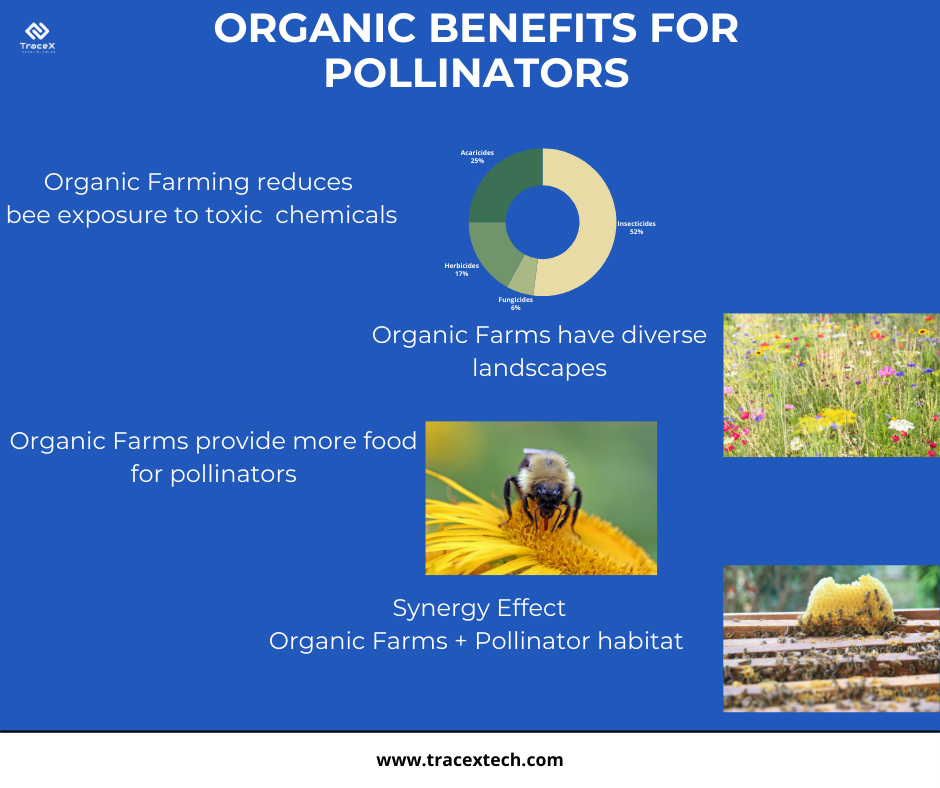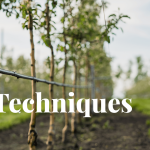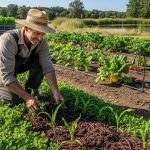Have you ever wondered how that delicious organic apple or vibrant bunch of carrots made it to your plate? You might be surprised to learn that the unsung heroes behind these fresh, organic foods are pollinators.
Yes, those buzzing bees, fluttering butterflies, and even some birds play a crucial role in ensuring your food is not only plentiful but also brimming with nutrients. Imagine a world where your favorite fruits and vegetables become scarce or lose their quality.
It’s a reality we’re inching towards if we overlook the importance of these tiny workers. Pollinators are the backbone of organic food production, helping to maintain the biodiversity and health of ecosystems. Without them, the organic food you love could become a luxury. Stay with us as we dive deeper into how these fascinating creatures contribute to the food you enjoy and the steps you can take to support them. Understanding the role of pollinators might just change the way you think about your next meal. Ready to uncover the secrets behind your organic produce? Let’s explore together.
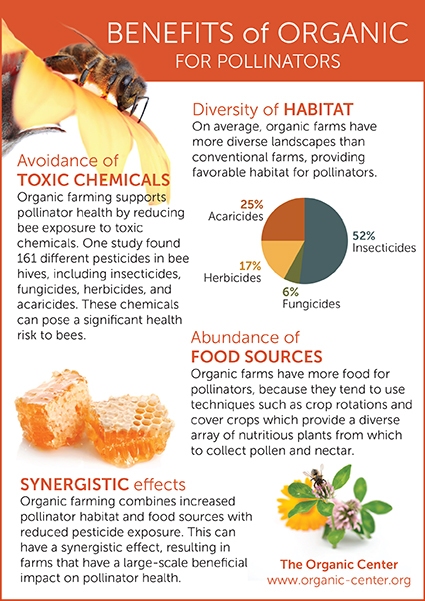
Pollinators And Biodiversity
Pollinators play a vital role in organic food production. They are the unsung heroes of agriculture. They ensure the growth of a diverse range of crops. Their work goes beyond pollinating flowers. It supports the health of entire ecosystems. Pollinators help maintain biodiversity in organic farming. This biodiversity is crucial for healthy soil and robust crops. Let’s explore how pollinators contribute to biodiversity in organic farming.
Pollinators Support Diverse Plant Species
Pollinators encourage the growth of different plant species. This diversity enriches soil health. Different plants provide varied nutrients to the soil. The improved soil supports stronger crop growth. It reduces the need for chemical fertilizers. This aligns perfectly with organic farming principles.
Pollinators Enhance Ecosystem Health
Pollinators boost the overall health of ecosystems. They help plants reproduce, ensuring plant diversity. More plant types mean more habitats for various creatures. A healthy ecosystem supports a wide range of wildlife. This strengthens the natural balance. It helps control pests naturally, aiding organic farms.
Pollinators Promote Genetic Diversity
Pollinators aid in the genetic diversity of crops. They transfer pollen between different plants. This exchange supports diverse plant genetics. Diverse genetics lead to resilient crops. Resilient crops can withstand diseases and pests. This reduces the need for chemical interventions.
Pollinators Encourage Sustainable Practices
Organic farming relies on sustainable methods. Pollinators are key to these practices. Their work ensures natural crop fertilization. This reduces reliance on synthetic chemicals. Farmers save on costs and protect the environment. Pollinators are essential for sustainable agriculture.
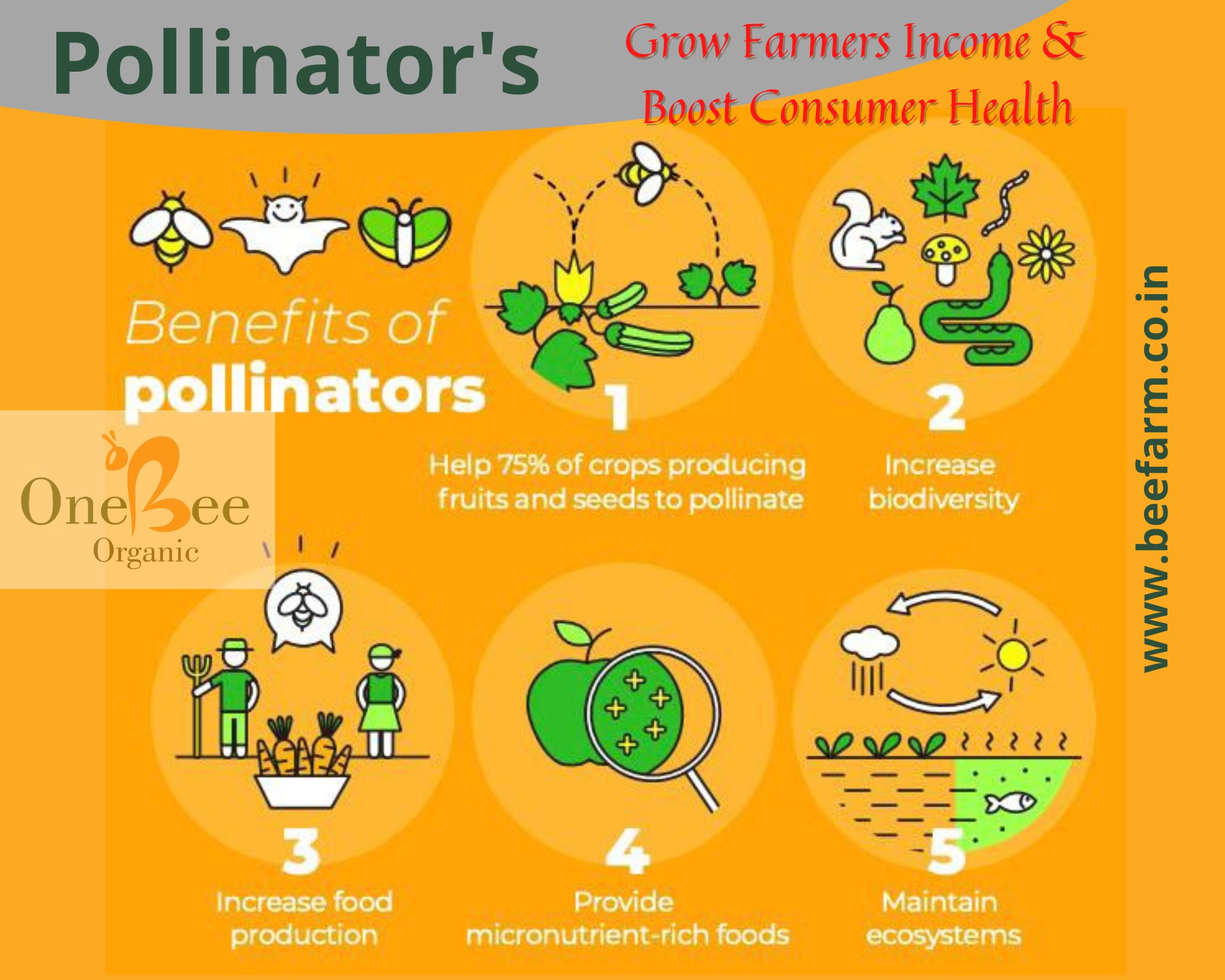
Impact On Crop Yields
Pollinators play a crucial role in boosting crop yields for organic food production. They enhance plant reproduction, ensuring healthier and more abundant harvests. Their presence significantly influences the quality and quantity of organic produce.
Organic food production relies heavily on pollinators, and their impact on crop yields is immense. Pollinators, such as bees, butterflies, and birds, play a crucial role in the reproduction of many plants, which directly affects the quantity and quality of the crops produced. Without these diligent workers, the yields of many organic farms would plummet, affecting the availability and affordability of organic produce.Why Pollinators Matter For Crop Yields
Pollinators transfer pollen from one flower to another, enabling plants to produce fruits and seeds. This process is essential for crops like apples, almonds, and tomatoes. In fact, some estimates suggest that more than 75% of the world’s crops depend on pollination. Without pollinators, crop yields would drop dramatically. Some plants might not produce any fruit at all. This would not only reduce the quantity of food available but could also increase prices.The Direct Connection Between Pollinators And Higher Yields
Imagine visiting an organic farm where bees buzz busily around. The farmer explains that thanks to these bees, their tomato plants are thriving, producing more tomatoes than ever before. Pollinators increase the number of fruits per plant and improve their quality. Higher yields mean more produce to sell and consume. This benefits both farmers and consumers, as it can lead to better pricing and availability.Challenges Pollinators Face
You might wonder, with such a critical role, why are pollinators struggling? Habitat loss, pesticides, and climate change are major threats. Many farmers are actively creating pollinator-friendly environments to combat these challenges. By planting diverse flowers and reducing pesticide use, they support pollinator health. This not only helps pollinators but also boosts crop yields.How You Can Make A Difference
Even if you’re not a farmer, your actions can support pollinators. Consider planting a small garden with pollinator-friendly plants. Simple choices like this can make a big difference. Support local organic farms that prioritize pollinator health. Every little bit helps to ensure robust crop yields and a healthier ecosystem. Have you ever thought about the food on your plate and the tiny creatures that make it possible? Next time you enjoy a crisp apple or juicy tomato, remember the pollinators that helped produce them. What steps will you take to support these vital creatures?Pollinator-friendly Practices
Pollinators like bees and butterflies are vital for organic food production. They help plants grow by spreading pollen, ensuring rich harvests. Supporting these creatures boosts crop yield and maintains healthy ecosystems.
Pollinators are the unsung heroes of organic food production. They play a critical role in the growth of fruits, vegetables, and nuts. By adopting pollinator-friendly practices, you can support these vital creatures and ensure a thriving organic garden or farm. Whether you are a seasoned farmer or a backyard gardener, simple changes can make a big difference. ###Creating A Diverse Habitat
A variety of plants attracts a wide range of pollinators. Consider planting native flowers alongside your crops. They provide shelter and food throughout the year. This diversity mimics a natural ecosystem, encouraging pollinators to visit and stay. ###Minimizing Chemical Use
Chemicals can harm pollinators. Opt for organic fertilizers and pest control methods. This makes your garden safer for bees, butterflies, and other beneficial insects. Are you aware of the impact synthetic pesticides have on the environment and pollinators? ###Providing Water Sources
Pollinators need water just like any other creature. A shallow dish with pebbles can serve as a safe drinking spot. Place it in a quiet area of your garden. This small effort can significantly boost pollinator visits. ###Planning Seasonal Blooms
Continuous blooming ensures pollinators always have access to nectar. Plan your garden so something is always in bloom. Different plants flower at different times, keeping pollinators well-fed throughout the seasons. ###Creating Nesting Sites
Pollinators need places to nest and reproduce. Leaving some bare soil or installing bee hotels can help. These simple structures provide the perfect environment for solitary bees to thrive. Have you ever considered how your garden layout affects pollinator nesting? ###Engaging With The Community
Sharing your experiences and learning from others can enhance your pollinator-friendly practices. Join local gardening groups or online forums. By working together, communities can create larger habitats that support pollinators across neighborhoods. Adopting these pollinator-friendly practices not only benefits your organic garden but also contributes to the global effort of preserving these essential creatures. What changes will you make to support pollinators in your garden?
Challenges And Conservation Efforts
Pollinators play a crucial role in organic food production. Yet, their survival faces significant challenges. Conservation efforts aim to address these issues. Ensuring pollinators thrive is vital for sustainable agriculture.
Challenges In Pollinator Populations
Pollinator populations are declining rapidly. Habitat loss is a major factor. Urban development destroys natural habitats. Pesticides also harm pollinators. They affect bee health and reproduction. Climate change disrupts migratory patterns. This impacts food availability. Diseases and parasites weaken pollinators. They spread quickly among colonies. These challenges threaten food security.
Conservation Strategies For Pollinators
Creating pollinator-friendly habitats is crucial. Plant native flowers and plants. They provide food and shelter. Reduce pesticide usage. Choose organic alternatives. Support organic farming practices. They promote biodiversity. Educate communities on pollinator importance. Awareness leads to conservation action. Encourage government policies. Protect pollinator habitats through legislation.
Community Involvement In Conservation
Community gardens can support pollinators. Plant diverse crops and flowers. Schools can educate students. Teach about pollinators and conservation. Local businesses can contribute. Support pollinator-friendly products and practices. Individuals can take small actions. Install bee hotels or plant wildflowers. Every effort counts towards a healthier ecosystem.
Conclusion
Pollinators play a vital role in organic food production. They help plants grow and produce food. Without them, many crops would struggle. Bees, butterflies, and birds are essential partners in farming. They ensure healthy and abundant harvests. Farmers rely on these natural helpers.
Organic farming benefits greatly from pollinators. Supporting them means healthier crops. It also means better food for everyone. Protecting pollinators is crucial. Simple steps can help. Plant flowers, avoid chemicals, and support local farms. Together, we can sustain organic farming.
For a better future and healthier planet.

